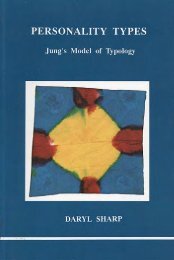Digesting Jung: Food for the Journey - Inner City Books
Digesting Jung: Food for the Journey - Inner City Books
Digesting Jung: Food for the Journey - Inner City Books
Create successful ePaper yourself
Turn your PDF publications into a flip-book with our unique Google optimized e-Paper software.
Reality As We Know It 29<br />
projection is completely automatic and unintentional. Our eyes<br />
catch ano<strong>the</strong>r’s across a crowded room and we are smitten, head<br />
over heels. Or we are immediately repelled by what we “see.” We<br />
may know nothing about that person; in fact <strong>the</strong> less we know <strong>the</strong><br />
easier it is to project. We fill <strong>the</strong> void with ourselves. Active projection,<br />
also called empathy, occurs when you feel yourself into <strong>the</strong><br />
o<strong>the</strong>r’s shoes by imagining what he or she is going through. This is<br />
a positive concomitant of most close friendships.<br />
There is a thin line between empathy and identification. Identification<br />
presupposes no separation between subject and object, no<br />
difference between me and <strong>the</strong> o<strong>the</strong>r person. We are two peas in a<br />
pod. What is good <strong>for</strong> me must be good <strong>for</strong> him—or her. Many relationships<br />
run aground on this mistaken notion. It is <strong>the</strong> motivation<br />
<strong>for</strong> much well-meaning advice to o<strong>the</strong>rs, and <strong>the</strong> premise of any<br />
<strong>the</strong>rapeutic system relying on suggestion or adaptation to collectively<br />
sanctioned behavior and ideals.<br />
In close relationships, identification is as common as potatoes.<br />
When you identify with ano<strong>the</strong>r person, your emotional well-being<br />
is intimately linked with <strong>the</strong> mood of that person and his or her attitude<br />
toward you. Nei<strong>the</strong>r can make a move without double-thinking<br />
<strong>the</strong> effect on <strong>the</strong> o<strong>the</strong>r, which automatically inhibits <strong>the</strong> selfexpression<br />
of both. Such a relationship is psychologically no different<br />
from that between parent and child, nor is it easy to tell, at any<br />
given time, who is parent and who is child.<br />
Projection, if it doesn’t go as far as identification, is actually<br />
quite useful in terms of self-knowledge. When we assume something<br />
about ano<strong>the</strong>r person and <strong>the</strong>n discover this to be an illusion,<br />
we are obliged to realize that <strong>the</strong> world and those in it are not our<br />
own creation. If we are reflective, we can learn something about<br />
ourselves. This is called withdrawing projections—bringing <strong>the</strong>m<br />
home, so to speak.<br />
A common example of projection is that of a husband or wife<br />
who suspects <strong>the</strong> o<strong>the</strong>r of an illicit affair. Of course this may be a<br />
true perception, but if it is unfounded in reality it may be that <strong>the</strong>










